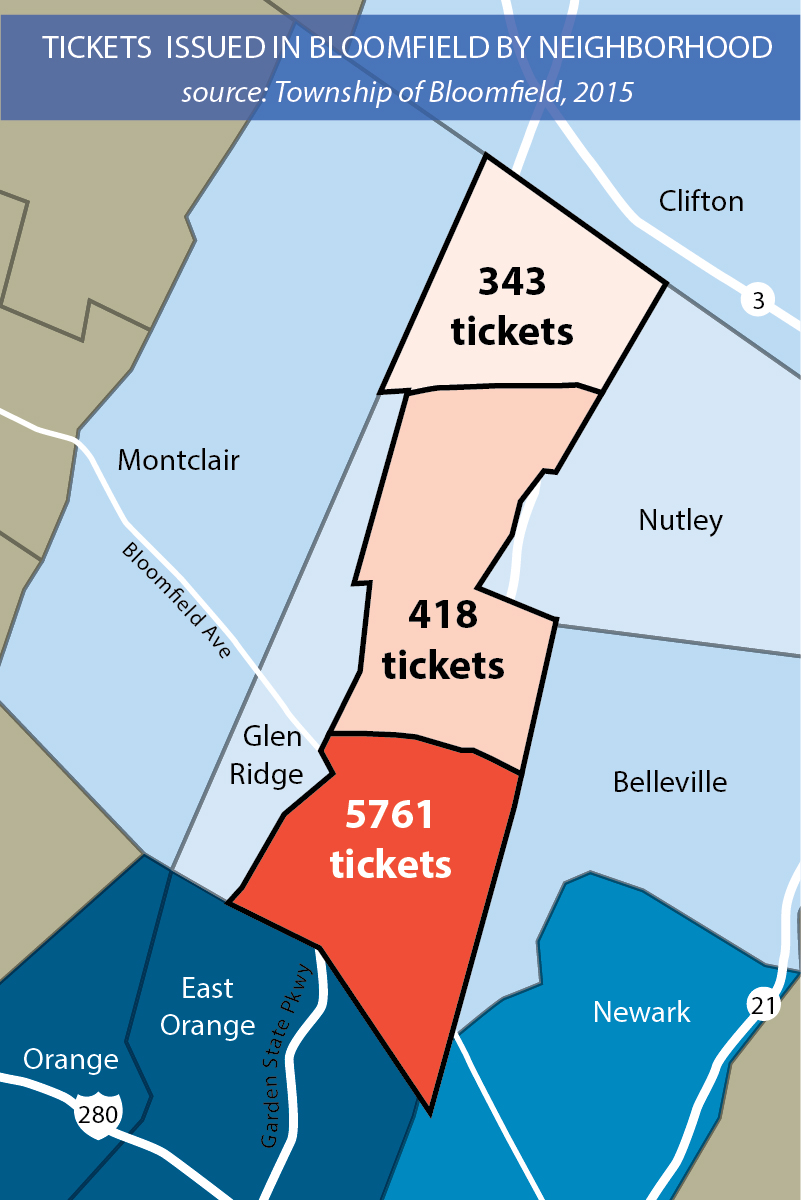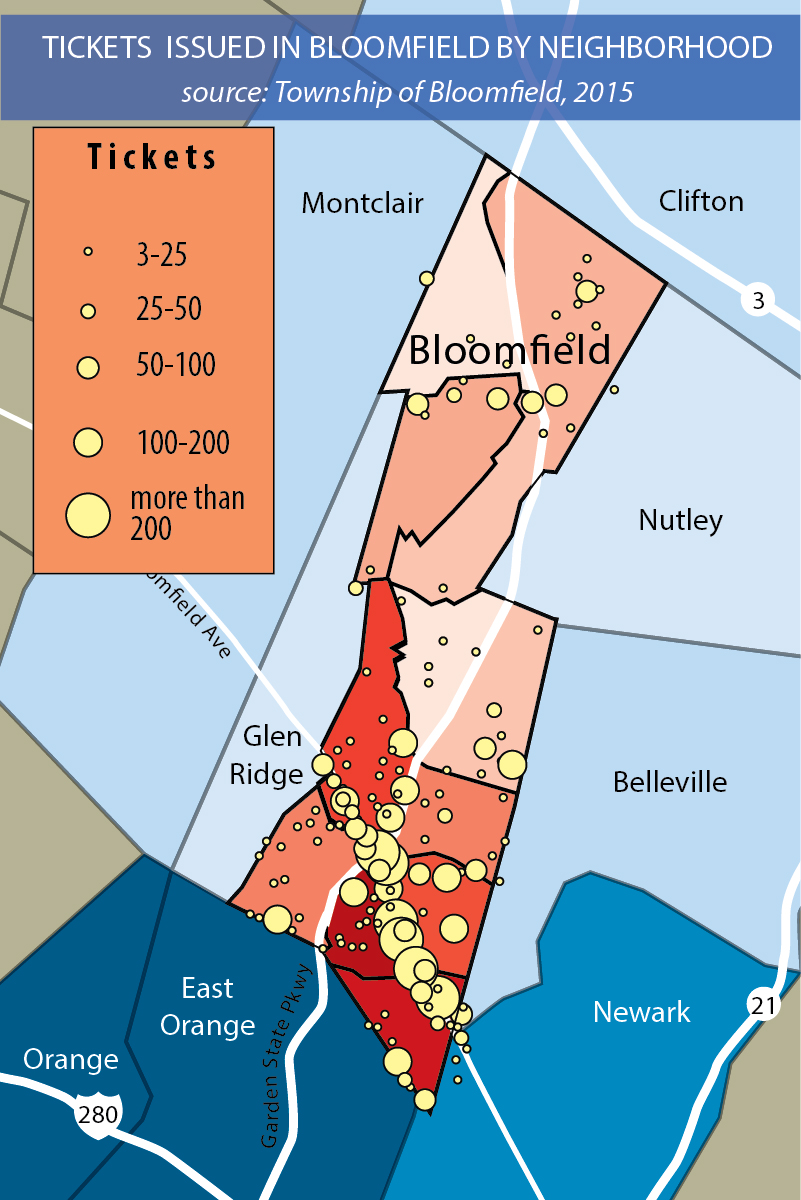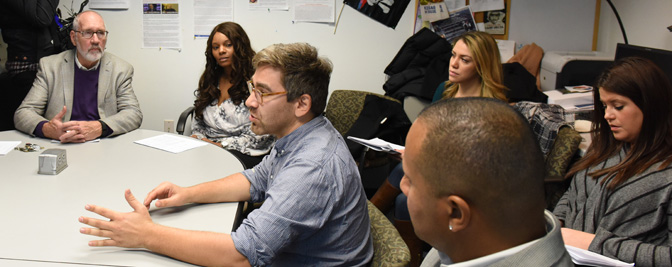A new report from Seton Hall Law School Center for Policy & Research has found that in the majority-white municipality of Bloomfield, New Jersey, nearly 80 percent of traffic tickets are issued to African American and Latino drivers, according to a Vice HBO News Report.
SETON HALL LAW REPORT REVEALS RACIAL PROFILING IN POLICE STOPS IN ESSEX COUNTY, NJ TOWN
APRIL 11, 2016
Report shows nearly 80% of traffic tickets issued to African American and Latino drivers in predominantly white Bloomfield, New Jersey
Professor Mark P. Denbeaux: “The Bloomfield Police run an extremely effective border patrol that targets people of color, and they employ discriminatory traffic stops and ticketing to produce a lucrative revenue stream for the Township.”
Newark, NJ — The Seton Hall Law School Center for Policy & Research has issued a report that analyzed both in-person court appearances and a database of 9,715 tickets in the Township of Bloomfield, New Jersey. The report shows a persistent and disproportionate representation of African Americans and Latinos in the courtroom as compared to their representation in either Bloomfield itself or in the State of New Jersey.
Pictured, from left, are Kelley Kearns ’18, Fadja Tassy ’17, Marquis Whitney ’17, Jason Castle ’18, Professor Mark Denbeaux, Simon Ostrovsky, VICE NEWS Executive Producer, and Richard Rivera (report consultant).
The report, “Racial Profiling: Bloomfield Police and Bloomfield Municipal Court,” details the observations of a team of Seton Hall Law students working for its Center for Policy & Research as Fellows; they focused on race and ethnicity of defendants in Bloomfield’s traffic court over a four-week period in Fall 2015.
The Fellows also reviewed a database of the 9,715 tickets issued in Bloomfield to unique drivers over a 12-month period to map the incidence of ticketing in Bloomfield by region and neighborhood, and to corroborate the courtroom observation data, finding the number of ticketed Latinos closely approximated the number of Latinos observed in the courtroom.
“We made two important discoveries,” said Professor Mark P. Denbeaux, Director of the Center for Policy & Research. “The Bloomfield Police run an extremely effective border patrol that targets people of color, and they employ discriminatory traffic stops and ticketing to produce a lucrative revenue stream for the Township.”
Among the findings:
 African Americans and Latinos accounted for an astounding 78% of the individuals observed appearing in Bloomfield Municipal Court for traffic tickets (n=799) — 43% African American, 35% Latino, 20% white, and 2% other. This is in inverse proportion to the demographics of Bloomfield, which is roughly 60% white, 18.5% African American, and 24.5% Latino.
African Americans and Latinos accounted for an astounding 78% of the individuals observed appearing in Bloomfield Municipal Court for traffic tickets (n=799) — 43% African American, 35% Latino, 20% white, and 2% other. This is in inverse proportion to the demographics of Bloomfield, which is roughly 60% white, 18.5% African American, and 24.5% Latino.
- Remarkably, this racial disproportion was found not only across the board but in various subgroupings – including Bloomfield itself, whose African American and Latino residents accounted for 73% of Bloomfield residents observed before the court, as compared with only 24% white. Similarly, a racial disproportion in ticketing also existed across the five predominantly white border towns. Although the numbers are small (n=39), 64% of those ticketed with residences in the predominantly white border towns were African American or Latino, while only 33% were white.
- In looking for targeted areas, the database showed that an overwhelming majority of tickets were issued in the southernmost third of Bloomfield, which borders on Newark and East Orange, cities with large populations of minorities: Newark is 26.3% white, 52.3% African American and 33.8% Latino; East Orange is 4% white, 88.5% African American and 7.9% Latino. (see map, right, excluding areas where less than 100 tickets written; Broad St., which runs through all three regions, addresses not marked; JFK Drive, two regions, also not marked.) The triangle of Bloomfield that juts into Newark and East Orange alone accounted for more than 50% of the tickets issued in the lower third of Bloomfield.
- With African Americans and Latinos accounting for 78% of observed court appearances, such individuals were cited 7,566 times during the year of the study. At an average cost of $137 apiece, not counting surcharges, the total paid by African Americans and Latinos would amount to more than $1 million in revenue for Bloomfield.
- Residents of Newark and East Orange, who were observed to have received 29% of all tickets issued in Bloomfield, would account for $400,000 in revenue to the Township.
- Bloomfield Municipal Court’s budgeted salaries were projected to have more than doubled in 2015, from $350,600 in 2014 to an estimated $760,794 in 2015. In 2014, Bloomfield received $1,116,081.00 in traffic court revenue; from July 2015 to September 2015, Bloomfield’s moving violation ticket revenue was up 138%.
 “Our study revealed what essentially amounts to a ‘wall’ of police action erected against the Newark and East Orange border areas and their predominantly African American and Latino residents,” noted report co-author and Seton Hall Law student Jason Castle ’18. “As an African American I wasn’t shocked, but I was disheartened to see the numbers in black and white; as a law student, I was dismayed to see the law being used as a weapon against the people; and as a Councilman from nearby Teaneck, NJ, I was appalled when I researched and compiled the budget, ticket revenue and salary projections for the Township of Bloomfield. Those numbers told a story that I wished I’d never heard.” (Map on left same criteria as above.)
“Our study revealed what essentially amounts to a ‘wall’ of police action erected against the Newark and East Orange border areas and their predominantly African American and Latino residents,” noted report co-author and Seton Hall Law student Jason Castle ’18. “As an African American I wasn’t shocked, but I was disheartened to see the numbers in black and white; as a law student, I was dismayed to see the law being used as a weapon against the people; and as a Councilman from nearby Teaneck, NJ, I was appalled when I researched and compiled the budget, ticket revenue and salary projections for the Township of Bloomfield. Those numbers told a story that I wished I’d never heard.” (Map on left same criteria as above.)
Professor Denbeaux has been active in civil rights and human rights issues throughout his career. “Racial discrimination used to be obvious and life-threatening – ‘the wolf at the door,’” Professor Denbeaux observed. “It sometimes still is, but now it’s more often insidious and corrosive, eating away at both the dignity and quality of life of people of color – it’s the ‘termites in the floor.’”
“When a black man is stopped by the police, both he and the cop know that anything the cop writes on a ticket, or claims to be true, will be upheld by a Traffic Court judge,” Professor Denbeaux concluded. “When that happens repeatedly over a protracted period of time, it takes a toll that you can’t measure in dollars.”
The Center for Policy & Research invites law students nationwide to contact it and replicate the investigation process within their own communities. Professor Denbeaux recalls some of the most important work in the civil rights movement was done by students. “Voter registration may not have been glamorous, but students did it day after day, month after month and it worked,” notes Denbeaux. “Seton Hall students have shown that that can happen today, too. Municipal courts are the ground zero and proving grounds for racial profiling and discrimination today. This is where it all starts. Whether in Ferguson or Bloomfield, it’s predatory, endemic, money hungry and wrong — and it has to stop. Go to the courtrooms and count, and then publish your findings. Then let the town and court give an accounting of its practices — if it can.” To read the report for further findings and methodology, visit law.shu.edu/bloomfieldtraffic.

Pictured, from left: Professor Mark Denbeaux, Lakisha Finkelstein ‘17, Simon Ostrovsky, Richard Rivera, Johanna Carmona ’17, and Shannon Doyle ‘17.
Seton Hall University School of Law, New Jersey’s only private law school, and a leading Catholic law school in the New York metropolitan area, is dedicated to preparing students for the practice of law through excellence in scholarship and teaching, with a strong focus on clinical education. The Center for Policy and Research enables students to gain practical experience while engaging in research and analysis that promotes respect for the rights of individuals worldwide. The students examine primary sources pertaining to the laws and practices of the U.S. and local government, as well as the reliability of forensic evidence for criminal investigations and prosecution. Seton Hall Law is located in Newark, NJ and offers both day and evening degree programs.

